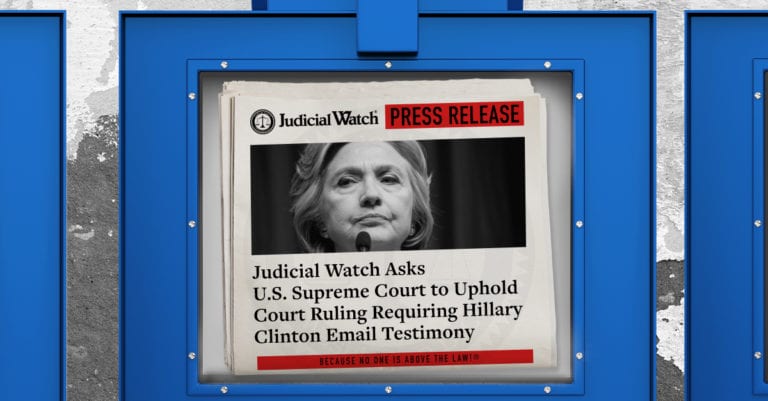
Judicial Watch Asks U.S. Supreme Court to Uphold Court Ruling Requiring Hillary Clinton Email Testimony

(Washington, DC) – Judicial Watch announced today that it filed a petition for writ of certiorari (“cert petition”) with the U.S. Supreme Court asking it to take up its challenge to an appeals court order exempting Hillary Clinton from testifying under oath about her emails. Judicial Watch argues the court should hear its case because the U.S. Court of Appeals for the District of Columbia Circuit erred in giving Clinton unwarranted special treatment that conflicts both with Supreme Court precedent and the precedents of other courts of appeal, including its own.
This cert petition arises from the Judicial Watch Freedom of Information Act (FOIA) lawsuit (Judicial Watch v. U.S. Department of State (No. 1:14-cv-01242), which led directly to the disclosure of Clinton’s use of a nongovernment email server to conduct government business. On March 2, 2020, U.S. District Court Judge Royce Lamberth authorized Judicial Watch to depose Clinton about her emails and the existence of relevant Benghazi attack documents. The court also ordered the deposition of Clinton’s former Chief of Staff, Cheryl Mills, and two other State Department officials.
Clinton and Mills filed an emergency writ of mandamus appeal to avoid testifying. On August 31, 2020, the D.C. Court of Appeals granted Clinton’s petition for mandamus relief, allowing her to avoid giving sworn testimony in the Judicial Watch lawsuit.
As Judicial Watch argues in its cert petition, granting Clinton this extraordinary relief flies in the face of the D.C. Circuit’s own precedent, most recently in the Michael Flynn case, who, unlike Clinton, was denied mandamus relief.
Judicial Watch also argues that the appellate decision allowing Hillary Clinton to avoid testimony dramatically undermines the Freedom of Information Act:
In effect, it eliminates any discovery into the actions of agency officials or employees other than FOIA officers – walling off from any inquiry officials or employees who may be less than honest with FOIA officers or who might seek to conceal agency records from FOIA officers to prevent disclosure to the public, among other matters plainly relevant to an agency’s good faith in responding to FOIA requests.
***
It is especially important that this misapplication of longstanding precedent be corrected because the D.C. Circuit’s far-reaching decision will nullify the “citizens’ right to be informed about ‘what their government is up to’” and for all intents and purposes, it will eradicate the district courts’ role as the enforcement arm of FOIA, as Congress intended.
“No court should undermine the Freedom of Information Act and the rule of law by giving Hillary Clinton special protection from having to testify about her emails,” stated Judicial Watch President Tom Fitton. “The Supreme Court should cast politics aside and affirm that Hillary Clinton is not above the law.”
###















